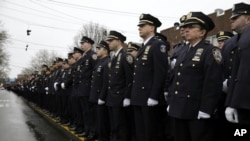Law enforcement officers gather on the grounds of the U.S. Capitol in Washington Friday for a memorial service and wreath-laying ceremony in honor of fellow officers killed in the line of duty. The event culminates National Police Week, the annual tribute to law enforcement service and sacrifice.
And this year the memorial service may be particularly sobering. Police fatalities in the line of duty are up dramatically.
In 2013, 27 law enforcement officers were feloniously killed in the line of duty in the United States, the lowest annual total going back to 1980. That figure nearly doubled to 51 last year according to preliminary statistics released this week by the Federal Bureau of Investigation (FBI).
Forty-six of the 51 deaths involved guns, while four officers were killed by vehicles used as weapons and one died after being beaten, the FBI said.
Bill Johnson, executive director of the National Association of Police Organizations, said the 89-percent spike from 2013 to 2014 is of "great concern" to his organization, which represents some 240,000 rank-and-file officers, as well as police groups nationwide. He attributed the rise to a "larger number of intentional attacks, of ambushes, of occasions where there's a traffic stop and the person stopped immediately shoots gunfire at the police, or [cases of] deliberate assassinations."
Officers assassinated
Johnson singled out two incidents where officers were slain in 2014 with no provocation or warning. In June, Las Vegas policemen Alyn Beck and Igor Soldo were shot by a married couple, Jerad and Amanda Miller, at a pizzeria. The Millers claimed to be on an anti-government, anti-police crusade and boasted about starting a "revolution."
In December, New York City officers Wenjian Liu and Rafael Ramos were killed by Ismaaiyl Abdullah Brinsley, who approached the window of their patrol car and shot them to death. Prior to the assault, Brinsley had threatened revenge for the police-shooting death of Michael Brown in Ferguson, Missouri and the death of Eric Garner, who died after police put him in a chokehold in Staten Island, N.Y. Brinsley wrote on social media that “I’m putting wings on pigs today. They take 1 of ours…Let’s take 2 of theirs."
"They were just sitting there eating their lunch, and they were just assassinated in the head," Johnson said of the two Las Vegas officers. "We're tragically seeing more incidents like that."
This comes as police officers are under increased scrutiny in the U.S. due to allegations of brutality, many of them stemming from the deaths of unarmed black men at the hands of law enforcement.
Last month, a black man, Freddie Gray, died a week after suffering a severe neck injury while in police custody in Baltimore. His death sparked rioting, looting and clashes between protesters and police in that city. Six officers have since been indicted in Gray's death on charges including second-degree murder and involuntary manslaughter.
The chant, "hands up, don't shoot," has come to be emblematic of the protest movement that has sprung up around deaths like Gray's and Michael Brown's. It has been used publicly by U.S. lawmakers on the floor of the House of Representatives and professional athletes, among other prominent figures. It has a negative impact on the reputation of police officers, according to Johnson.
Tarnished reputations
"It’s false, but the accusation is so horrible," Johnson said. "The accusation keeps bringing to mind - hands up, don’t shoot - that this teenager in Missouri had his hands up and was surrendering and the officer just executed him for no reason or for a racist reason, and none of that was true. But definitely, it poisons the atmosphere, and that makes it more dangerous for the individual men and women who are out there trying to do this job, trying to do police work, trying to serve their communities.”
Asked if the accusations of police brutality are valid, Johnson said there are cases where "officers err and sometimes tragically." But he added that in the "vast majority" of situations involving members of the law enforcement community, "they go by the book, they are successful, they are not violent, they are in accord with the law."
FBI Director James Comey noted the tense relationships between many police departments and the communities that they serve, in an online video released to time with National Police Week. He also thanked all law enforcement personnel for their service and said the most important part of National Police Week is "remembering and honoring those who have made the ultimate sacrifice to try and make their communities safe."
"I think it’s very, very important for all of us that we do our absolute best to try to see clearly those people we serve and to look for opportunities to have them see us -- see the nature and character of the people who are in law enforcement and why we do the work that we do," Comey said. "I’m confident that if we have that conversation, and we have good clear seeing in both directions, we will heal some of the divisions we’re facing now around this country."









